Before being drafted, Carpenter had also played for the United States at the 1981 World Junior Championships, scoring an impressive 5 goals and 9 points in 5 games.
Carpenter defied the odds and never played a single game of college or minor league hockey, making the Capitals straight out of his first training camp, becoming the first player to go directly from a US High School directly to the NHL when he made his debut on October 7, 1981, which included a goal and an assist that night, with his assist coming just 12 seconds into the start of his career! His acclimation time to the hard hitting world of the NHL was virtually non-existent, as the 18-year-old rookie scored 32 goals and added 35 assists for 67 points in 80 games straight out of the box in 1981-82. His 32 goals included scoring 4 in a game vs. the St. Louis Blues on February 25, 1982.
He essentially repeated those numbers during his second season of 1982-83, avoiding any anticipated sophomore slump with another 32 goals and 37 assists for 69 points. Carpenter showed remarkable consistency in his third season with 68 points from 28 goals and 40 assists in 1983-84.
Before the 1984-85 season began, Carpenter again suited up for the United States, this time at the 1984 Canada Cup tournament, scoring a goal and 5 points in 6 games.
His 1984-85 season was one for the record books, as Carpenter, playing on a line with Mike Gartner, first broke Joey Mullen's record of 41 goals by an American on February 13th before setting his sights on another milestone, which he achieved on this date in 1985 when he became the first American to ever score 50 goals in an NHL season in a 3-2 loss against the Montreal Canadiens. He would finish the season with a career highs with 53 goals, 42 assists and 95 points.
After singing a four year contract with the Capitals prior to the 1985-86 season, Carpenter saw his statistics regress to 27 goals and 56 points, while his penalty minutes rose to 105 from a previous high of 87. His 1986-87 season got off to a quite poor start with just 5 goals and 12 points in 22 games as he clashed with his head coach Bryan Murray, which led to a trade to the New York Rangers. While in Manhattan, Carpenter fought to find his way, with just 2 goals and 8 assists in 28 games with the Rangers before yet another trade before the season was over, this time to the Los Angeles Kings in the deal that brought Marcel Dionne to the Rangers.
With the Kings, his struggles continued, with only 2 goals and 5 points in 10 games. His 27 total points that season were equal to his lowest previous goal total in what was surely a lost season for Carpenter.
Following the NHL season, Carpenter pulled double duty for the United States, first playing in the only World Championships of his career, scoring a pair of goals and 4 points in 10 games. Later that fall, he again joined the American squad for the 1987 Canada Cup tournament, contributing a goal and 3 points in 5 games.
Looking for a fresh start, Carpenter scored 19 goals for the Kings in 71 games on his way to 52 points in 1987-88 after missing time due to a torn rotator cuff.
He was on pace for a similar season with Los Angeles in 1988-89, having scored 11 goals and 26 points after 39 games, having been limited by a broken right thumb and wrist in a New Year's Even exhibition game against the Soviet club Dynamo Riga, but Carpenter was again traded back across the country once more, this time to the Boston Bruins in his home state of Massachusetts. With Boston, Carpenter played in just 18 games due to breaking his other thumb, scoring 5 goals and 14 points.
Carpenter had a nice rebound in 1989-90, scoring 25 goals and 56 points in 80 games, his highest point total in four years. He missed the start of the 1990-91 season due to a knee injury in training camp. Once back on the ice, he played in 29 games, scoring 8 goals and 16 points before a shattered kneecap in early December ended his season.
His 1991-92 season was also limited, this time to 60 games, derailing a fine season during which he had scored 25 goals and 48 points while on a pace to score 65 points that season.
Due to concerns about his knee, the Bruins did not offer Carpenter a new contract, and he then signed as a free agent with his original club, the Capitals. He played 68 games with Washington in 1992-93, scoring 11 goals and 28 points.
When the Capitals did not pick up their option on his contract, Carpenter signed with the New Jersey Devils as a free agent for the 1993-94 season after earning a roster spot during a training camp tryout.
After playing 76 games for the Devils with 33 points that first season, Carpenter would play in 41 of the Devils 48 games in the lockout shortened 1994-95 season. By now his role as a featured offensive player had changed, and in his new role as a defensive checking forward under the guidance of Devil's head coach Jacques Lemaire, he managed 5 goals and 16 points and was a +19. In the playoffs, Carpenter played in 17 of the Devils 20 playoff games as they defeated the Detroit Red Wings to capture the only Stanley Cup of his career.
He would go on to play four more seasons with New Jersey, although he was often battling injuries which limited him to between 52 and 66 games, which included playing in his 1,000th NHL game on October 19, 1996. He would retire in 1999, never again scoring more than 27 goals after his record setting 53 goal season.
He would finish his career with 1,178 games played with 320 goals and 408 assists for 728 points and a Stanley Cup championship. In 2007 Carpenter was inducted into the United States Hockey Hall of Fame.
Today's featured jersey is a 1981-82 Washington Capitals Bobby Carpenter jersey as worn during his rookie season following his being drafted third overall, making him not only the highest American ever drafted at the time, but also the first American taken in the first round of the NHL Draft.
The Capitals wore their star-spangled jerseys from their inception in 1974-75 through the 1994-95 season. They brought back their original white jersey for the 2011 Winter Classic, the annual NHL outdoor game held on New Year's Day. They would wear the throwback white version as their third jersey for four seasons until changing to the red version as their alternate for the 2015-16 season.
Today's featured jersey is a 1994-95 New Jersey Devils Bobby Carpenter jersey as worn during the season the Devils won the only Stanley Cup of Carpenter's career.
The Devils originally wore red and green jerseys for a decade after their move to New Jersey from Colorado, where they were known as the Rockies in 1982-83. In 1992-93 the club changed to new red and black jerseys and they have remained unchanged ever since while steadfastly refusing to add a third jersey as well.
Today's video section looks back at Carpenter's time with the Capitals, recounting his best offensive seasons.

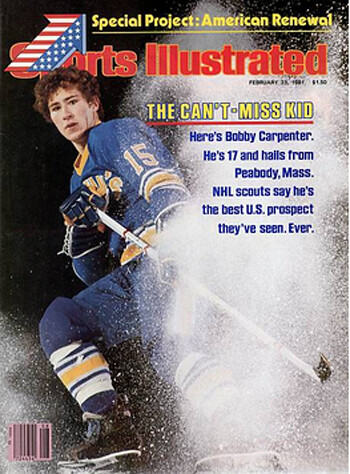
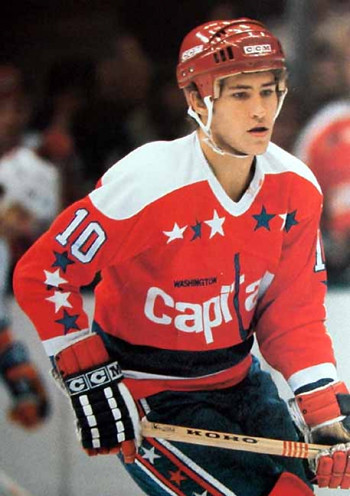
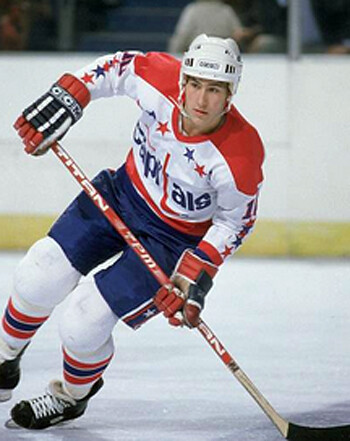
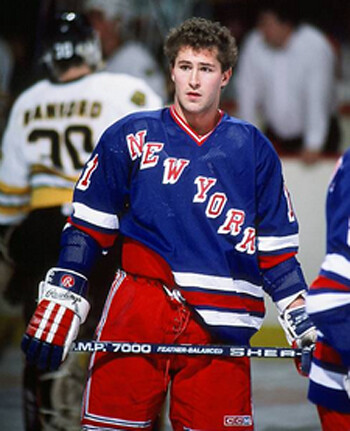
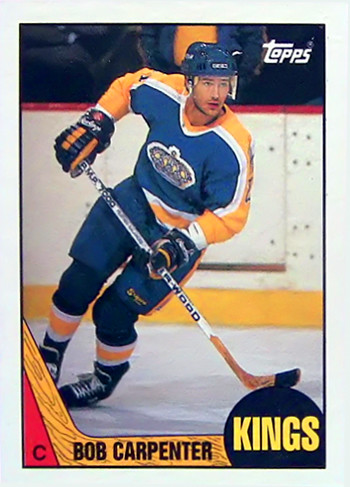
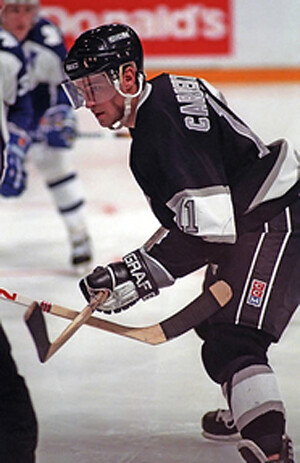
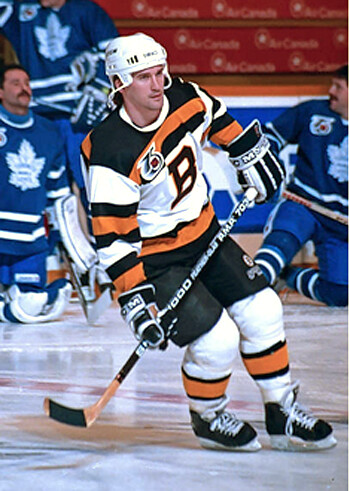
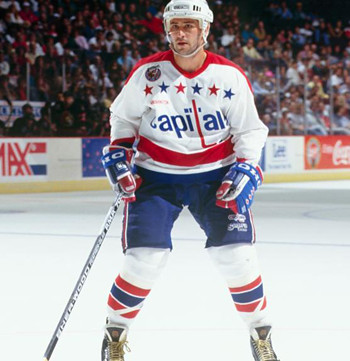
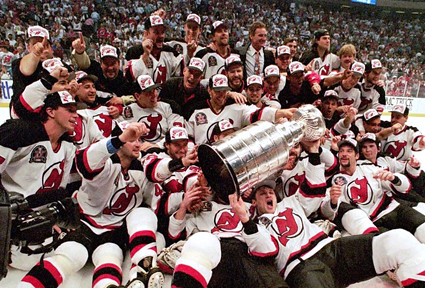
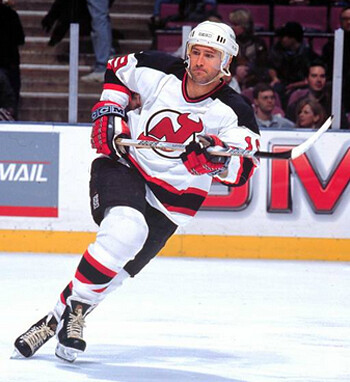
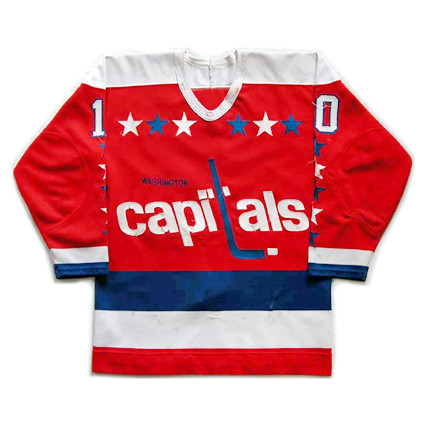
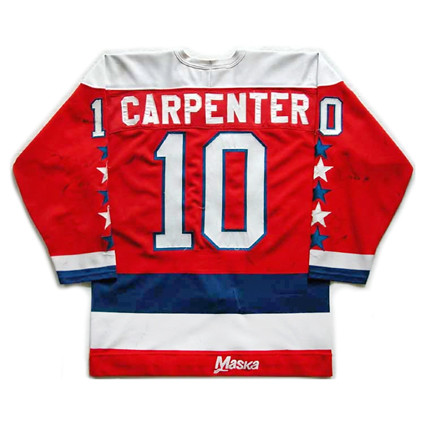
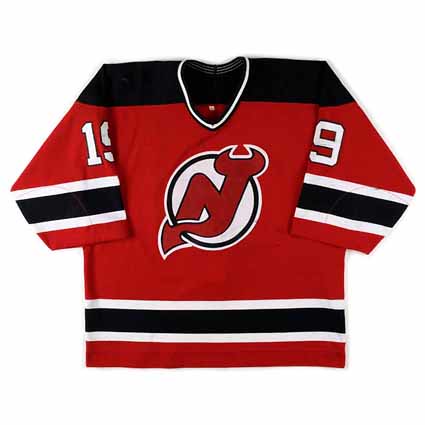
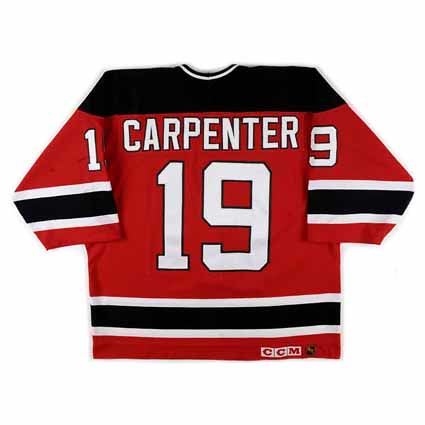










No comments:
Post a Comment
We welcome and encourage genuine comments and corrections from our readers. Please no spam. It will not be approved and never seen.